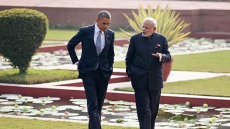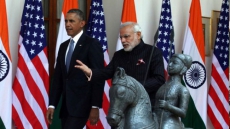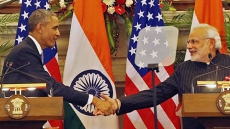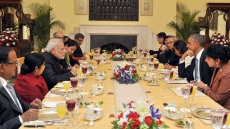France, chair of the UN Climate Change Conference, Thursday lauded Prime Minster Modi's commitment to clean energy reflected in his 100 Smart Cities project and the initiative towards scaling up solar energy use by 2020, describing them as "real ambitions".
"India's commitment to conserve 100,000 MW by 2020 and 100 smart cities are real ambitions. No doubt India will play a leading role in this effort (sustainable development) and do it under Modi who is dedicated to this goal," French Foreign Minister Laurent Fabius said at the inaugural session of 15th Delhi Sustainable Development Summit (DSDS).
"India is very important and a strategic partner" in the global endeavour to resolve the climate issue, Fabius later told IANS.
During his day-long official visit to India, Fabius met Modi, his Indian counterpart Sushma Swaraj, Environment Minister Prakash Javadekar and Railway Minister Suresh Prabhu.
Seen as a momentum-building measure ahead of Modi's potential visit to France later this year, Fabius, in their meeting, and touched upon a range of subjects for strategic partnership in urban development, tourism, education, climate, and nuclear energy.
Describing India as a "strategic partner" in hammering out a "universal and meaningful", he extended support to India's stand on transfer of clean energy technology developed by western countries.
"We will spare no effort to deliver the universal and meaningful agreement that the world needs... no doubt that India will play a leading role in this effort.
"You (India) need transfer of technology and it is necessary for a successful agreement in Paris.
"It is true that all nations are different national circumstances. We have to take into consideration these elements. It is not wise to oppose development and fight against climate destruction," Fabius said in an interaction with the media later.
As the chairperson of the COP21 - the UN Climate Change Conference to be held in Paris later this year - Fabius shared his vision and expectations from Paris 2015 at the three-day summit organised by The Energy and Resource Institute (TERI) here.
As the chair, he assured to have a "transparent, impartial, and ambitious" leadership and spare no effort in carving out a "universal and meaningful" agreement among 195 countries that would seek to limit global carbon emissions.
Paris is the common platform where over 150 countries would converge in December to discuss, negotiate and hammer out a global climate framework for global partners in the post-Kyoto Protocol regime.
Under the UN Framework Convention on Climate Change guidelines, the new climate order would seek to guide countries in undertaking initiatives to roll back greenhouse gas emission and adopt clean energy measures that would help cap the global temperature below two degrees.





